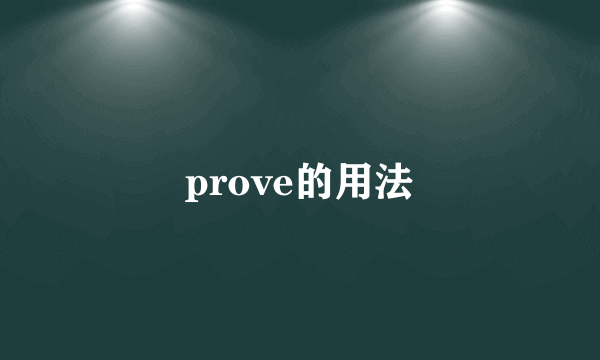prove的用法
的有关信息介绍如下:
prove的词语用法
1、prove的基本意思是“证明”,即以足够、可靠的证据来证明自己的观点或结论是正确的,而对方的论点或结果是站不住脚的。此外,也可表示证实有争议的人或物的品质、实力或适合性等。引申可作“检验”解。
2、prove既可用作及物动词,也可用作不及物动词。用作及物动词时,可接名词、代词、从句作宾语。prove还可接“to be+ n./adj./prep. -phrase”充当补足语的复合宾语, to be一般可以省略,但当to be是完成式即to have been时不可省略。
4、prove还可用作系动词,意思是“显现出是,被发现是”,其后可接“(to be)+ adj./prep. -phrase”或介词短语作表语。
5、prove的过去分词在英国是proved; 但在美国往往用proven, proven常用作形容词,在句中作定语。
扩展资料prove 读法 英 [pruːv] 美 [pruːv]
作动词的意思是: 证明;检验;结果是;发酵
词汇搭配
1、prove a gun 验枪
2、prove a man's worth 证明某人的价值
3、prove a meter 检验仪表
4、prove a new car model 试验一种新型汽车
5、prove a new weapon 检验新武器
6、prove a will 查验遗嘱
prove是个常用动词,也是一个多义动词.由于它的用法比较复杂,现归纳如下
一、prove作"证明;证实"解时,用法如下:
1.prove+名词/代词
He has proved his courage in the battle.他已在作战中证明了他的勇气.
This further proved the strength of our economy.这进一步证明了我们的经济实力.
Can you prove that?你能证实那一点吗?
2.prove+直接宾语(sth.)+to+间接宾语(sb.)
The difficulty was how he could prove his ideas to other scientists.困难在于他怎样向其他科学家证实他的想法.
Can you prove your theory to us?你能向我们证实你的理论吗?
3.prove+宾语+宾语补足语
(1)形容词作宾语补足语
They proved themselves wise and brave.他们证实自己机智、勇敢.
Facts have proved these worries groundless.事实证明,这些忧虑是没有理由的.
(2)名词作宾语补足语
She proved herself an able secretary.她证实自己是个能干的秘书.
He has proved himself a success.他已证明了自己是个成功者.
(3)动词不定式作宾语补足语
All this proved him to be an honest man.这一切都证明他是一个诚实的人.
The experiment proved his theory to be important to our research.实验证明他的理论对我们的研究是重要的.
4.prove+宾语从句
Galileo proved that the earth and all other planets move around the sun.伽利略证实地球和所有其它的行星都是绕太阳运转的.
But Einstein was able to prove that light coming from the stars was bent as it passed the sun.
然而爱因斯坦却能证明从恒星来的光线当其经过太阳时变弯曲了.
Can you prove where you were on May 10th?你能证实五月十日你在什么地方吗?
二、prove作"证明是;结果是;事实说明"解时,用作连系动词,可用于以下句型:
1.prove+形容词
The handbook proved most useful.这本手册证明很有用.
The medicine proved satisfactory.结果证明这药疗效令人满意.
2.prove+名词
She proved a very strict teacher.结果证明她是一位非常严格的老师.
His efforts, however, proved a failure.但他的努力结果都失败了.
3.prove+介词短语或副词
Perhaps this book will prove of some use to you in your studies.也许这本书会对你的研究有用处.
The power station was completed and proved up to standard.这座发电站建成了,证明质量符合标准.
4.prove+动词不定式
As time went on, Einstein's theory proved to be correct.随着时间的推移,爱因斯坦的理论证明是正确的.
She may prove to be the most suitable person for the job.结果她可能是最适合干这项工作的人.
--------------------------------------
用作连系动词,无被动语态
prove意思是证明. 一般来说, 在讲论证明的时候有3个关键元素。 1是证明的事情, 2是证明的人, 3是证明的根据。
如果是证明的事情为主语的时候, 那么prove就用被动。
比如说 That you didn't cheat in the last exam should be proved.你上次考试没作弊需要证明。 因为没作弊(被证明的事情)是做主语, 因此用被动。
如果是证明的人, 或者是根据作主语, 那么prove都用主动。
比如说 He can prove that you didn't cheat in the last exam. 他可以证明你上次没有作弊。 (证明人作主语)
The record of the supervisory system can prove that he didn't cheat in the last exam. 监视系统可以证明他上次没有作弊。(证据)
在举一个证据做主语的例子。
The way to prove his innocence is nothing. 没有一个方法是证明他是无辜的。 (这里暗示way是证明他无辜的证据)
在翻译成:被证明了/据考证的时候
be proved that
我觉得你老师的讲解有问题,哪有天天拿一个句子的名词性结构老是按照sb/sth去区别讲呢?
楼主想想,万一说话人采用拟人写法,把sth当做sb去看的话,那句子结构该怎么办呢?
这种观念是要不得的,建议楼主要取其精华,去其糟粕。
prove的基本用法如下:
1.
Vt.
考验/试验
如:She
decided
to
prove
his
honesty.
她决定考验他的诚实。
2.
Vt.
证明/证实
常用结构如下:
1)prove
sth
(to
sb)
如:Can
you
prove
your
theory
to
us?
2)
prove
+
that从句
How
did
you
prove
that
he
was
the
robber?
3)
prove
sb/sth
(to
be)
+
n./adj.
The
fingerprints
on
the
knife
proved
him
(to
be)
the
murderer.
3.
vt/vi.
结果是;被发现是;表现出(自己)是
结构:prove
(oneself)
+
(to
be)
+
n./adj.
The
weather
forecast
proved
(to
be)
accurate
on
the
next
day.
She
proved
(herself)
(to
be)
an
able
secretary.
如果对你有所帮助,请点击我回答下面的“选为满意回答”按钮,谢谢!



